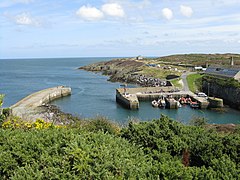Amlwch
| Amlwch | |
|---|---|
 Amlwch Port |
|
| Amlwch shown within Anglesey | |
| Population | 3,789 (2011) |
| OS grid reference | SH4492 |
| Community |
|
| Principal area | |
| Ceremonial county | |
| Country | Wales |
| Sovereign state | United Kingdom |
| Post town | AMLWCH |
| Postcode district | LL68 |
| Dialling code | 01407 |
| Police | North Wales |
| Fire | North Wales |
| Ambulance | Welsh |
| EU Parliament | Wales |
| UK Parliament | |
| Welsh Assembly | |
Amlwch (Welsh pronunciation: [ˈamlʊχ]) is a community and the most northerly town in Wales. It is situated on the north coast of the Isle of Anglesey, on the A5025 which connects it to Holyhead and to Menai Bridge. The town has no beach, but it has impressive coastal cliffs. Tourism is an important element of the local economy. At one time it was a busy port, with boats sailing to the Isle of Man and to Liverpool. A number of the houses date from the 19th century and add to the atmosphere of the town.
The local newspaper for northeastern Anglesey is Yr Arwydd ('The Sign'). Yr Arwydd is the local Welsh name for Mynydd Bodafon, the paper covers the area surrounding the mountain, and has an image of the summit as its logo.
The name Amlwch – a reference to the site of the town's harbour, Porth Amlwch – derives from Welsh am ("about, on or around") and llwch (an old word meaning "inlet, creek" - similar to the Gaelic word "loch" for a body of water).
According to legend in the Middle Ages, the town developed on a site that had a harbour but was not visible from the sea, which helped to reduce the chance of Viking attacks.
It grew rapidly in the 18th century near what was then the world's biggest copper mine at the nearby Parys Mountain. By the late 18th century, Amlwch had a population of around 10,000 and was the second largest town in Wales after Merthyr Tydfil. It was at this time that its harbour was also extended to accommodate the ships needed to transport the ore. At the 2011 census the Community had a population of 3,789
In the 1970s, Amlwch had an offshore single point mooring - Amlwch Oil Terminal - which was used to receive large oil tankers which were unsuitable for the Mersey. Reception tanks were located ashore and the oil was pumped from there to the refineries on the Manchester Ship Canal. The terminal closed in 1990.
...
Wikipedia

